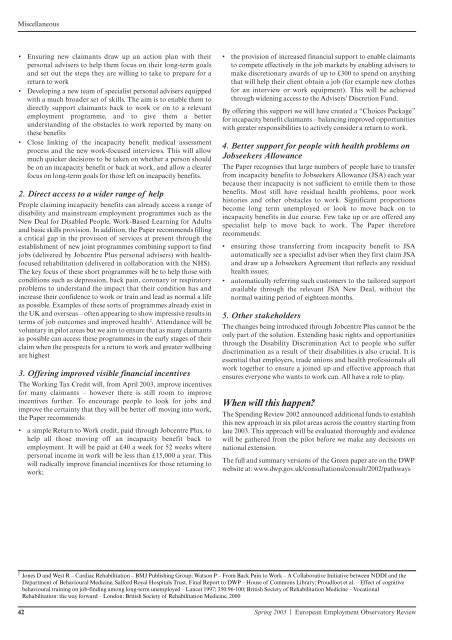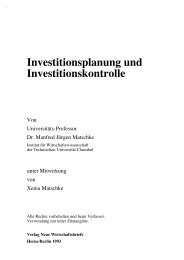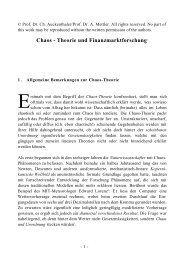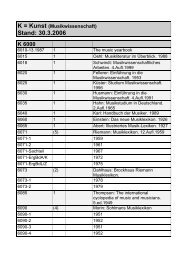FRANCE The
FRANCE The
FRANCE The
Create successful ePaper yourself
Turn your PDF publications into a flip-book with our unique Google optimized e-Paper software.
Miscellaneous<br />
• Ensuring new claimants draw up an action plan with their<br />
personal advisers to help them focus on their long-term goals<br />
and set out the steps they are willing to take to prepare for a<br />
return to work<br />
• Developing a new team of specialist personal advisers equipped<br />
with a much broader set of skills. <strong>The</strong> aim is to enable them to<br />
directly support claimants back to work or on to a relevant<br />
employment programme, and to give them a better<br />
understanding of the obstacles to work reported by many on<br />
these benefits<br />
• Close linking of the incapacity benefit medical assessment<br />
process and the new work-focused interviews. This will allow<br />
much quicker decisions to be taken on whether a person should<br />
be on an incapacity benefit or back at work, and allow a clearer<br />
focus on long-term goals for those left on incapacity benefits.<br />
2. Direct access to a wider range of help<br />
People claiming incapacity benefits can already access a range of<br />
disability and mainstream employment programmes such as the<br />
New Deal for Disabled People, Work-Based Learning for Adults<br />
and basic skills provision. In addition, the Paper recommends filling<br />
a critical gap in the provision of services at present through the<br />
establishment of new joint programmes combining support to find<br />
jobs (delivered by Jobcentre Plus personal advisers) with healthfocused<br />
rehabilitation (delivered in collaboration with the NHS).<br />
<strong>The</strong> key focus of these short programmes will be to help those with<br />
conditions such as depression, back pain, coronary or respiratory<br />
problems to understand the impact that their condition has and<br />
increase their confidence to work or train and lead as normal a life<br />
as possible. Examples of these sorts of programmes already exist in<br />
the UK and overseas – often appearing to show impressive results in<br />
terms of job outcomes and improved health 2 . Attendance will be<br />
voluntary in pilot areas but we aim to ensure that as many claimants<br />
as possible can access these programmes in the early stages of their<br />
claim when the prospects for a return to work and greater wellbeing<br />
are highest<br />
3. Offering improved visible financial incentives<br />
<strong>The</strong> Working Tax Credit will, from April 2003, improve incentives<br />
for many claimants – however there is still room to improve<br />
incentives further. To encourage people to look for jobs and<br />
improve the certainty that they will be better off moving into work,<br />
the Paper recommends:<br />
• a simple Return to Work credit, paid through Jobcentre Plus, to<br />
help all those moving off an incapacity benefit back to<br />
employment. It will be paid at £40 a week for 52 weeks where<br />
personal income in work will be less than £15,000 a year. This<br />
will radically improve financial incentives for those returning to<br />
work;<br />
• the provision of increased financial support to enable claimants<br />
to compete effectively in the job markets by enabling advisers to<br />
make discretionary awards of up to £300 to spend on anything<br />
that will help their client obtain a job (for example new clothes<br />
for an interview or work equipment). This will be achieved<br />
through widening access to the Advisers’ Discretion Fund.<br />
By offering this support we will have created a “Choices Package”<br />
for incapacity benefit claimants – balancing improved opportunities<br />
with greater responsibilities to actively consider a return to work.<br />
4. Better support for people with health problems on<br />
Jobseekers Allowance<br />
<strong>The</strong> Paper recognises that large numbers of people have to transfer<br />
from incapacity benefits to Jobseekers Allowance (JSA) each year<br />
because their incapacity is not sufficient to entitle them to those<br />
benefits. Most still have residual health problems, poor work<br />
histories and other obstacles to work. Significant proportions<br />
become long term unemployed or look to move back on to<br />
incapacity benefits in due course. Few take up or are offered any<br />
specialist help to move back to work. <strong>The</strong> Paper therefore<br />
recommends:<br />
• ensuring those transferring from incapacity benefit to JSA<br />
automatically see a specialist adviser when they first claim JSA<br />
and draw up a Jobseekers Agreement that reflects any residual<br />
health issues;<br />
• automatically referring such customers to the tailored support<br />
available through the relevant JSA New Deal, without the<br />
normal waiting period of eighteen months.<br />
5. Other stakeholders<br />
<strong>The</strong> changes being introduced through Jobcentre Plus cannot be the<br />
only part of the solution. Extending basic rights and opportunities<br />
through the Disability Discrimination Act to people who suffer<br />
discrimination as a result of their disabilities is also crucial. It is<br />
essential that employers, trade unions and health professionals all<br />
work together to ensure a joined up and effective approach that<br />
ensures everyone who wants to work can. All have a role to play.<br />
When will this happen?<br />
<strong>The</strong> Spending Review 2002 announced additional funds to establish<br />
this new approach in six pilot areas across the country starting from<br />
late 2003. This approach will be evaluated thoroughly and evidence<br />
will be gathered from the pilot before we make any decisions on<br />
national extension.<br />
<strong>The</strong> full and summary versions of the Green paper are on the DWP<br />
website at: www.dwp.gov.uk/consultations/consult/2002/pathways<br />
2 Jones D and West R – Cardiac Rehabilitation – BMJ Publishing Group; Watson P – From Back Pain to Work – A Collaborative Initiative between NDDI and the<br />
Department of Behavioural Medicine, Salford Royal Hospitals Trust, Final Report to DWP – House of Commons Library; Proudfoot et al. – Effect of cognitive<br />
behavioural training on job-finding among long-term unemployed – Lancet 1997; 350:96-100; British Society of Rehabilitation Medicine – Vocational<br />
Rehabilitation: the way forward – London: British Society of Rehabilitation Medicine, 2000<br />
42 Spring 2003 | European Employment Observatory Review

















